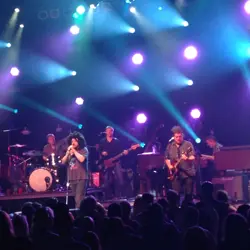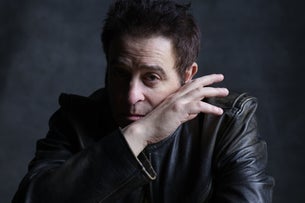 Counting Crows
Counting CrowsIt's nigh on 20 years now since Californian folk rockers Counting Crows hit the ground running with the release of their acclaimed debut, August And Everything After. While the album dropped in late-1993, it wasn't until early-'94 that it really began to get traction here and abroad, dragged along by the then omnipresent radio singles Mr Jones and Round Here, which soon made it the fastest selling album in the States since Nirvana's Nevermind went gangbusters a couple of years earlier.
While that sudden burst of fame initially took its toll (on frontman and songwriter Adam Duritz in particular), the band soon rallied and since that time things have stayed on a pretty even keel for Counting Crows. They've released six studio albums and, most crucially, built up a formidable reputation on the live front, accruing a solid and loyal following in the process. Their most recent album, Underwater Sunshine (2012), is actually a collection of left-of-centre covers, and while they've long been renowned for reinterpreting other people's work in the live realm, it was still an unexpected gambit for a band of their stature.
“I don't know, we've always wanted to do it,” Duritz ponders on the motivation for the covers collection. “I like reinterpreting, it's a purely cool discipline. Also I was working on a play at the time so the songs I was writing were going to that – I didn't want to write for two different things at the same time, so it was kind of perfect timing.
“The criterion [for Underwater Sunshine] was just really great songs that we could find an interesting take on. Some of them we'd already been playing live, others we came up with when we were making the record, but the criteria was that we just wanted to find really, really cool songs. It sort of ended up being the most obscure covers album ever made – which was not our intention – but I think it's reflective of the fact that there was also no intention to not make it that way. It was definitely not a criterion that songs needed to be well-known, they just needed to be really cool and we needed to find cool, interesting takes on them. Sometimes we'd pick a song that we really liked, but then our take would suck so we'd leave those off. It was basically just all on a whim, same as everything.”
Don't miss a beat with our FREE daily newsletter
As Duritz suggests, some tracks on Underwater Sunshine are relative staples – think The Faces' Ooh La La or Big Star's The Ballad Of El Goodo – but some, like Dawes' All My Failures, are hitherto unknown.
“I know Taylor [Goldsmith] and those guys, Dawes are great,” Duritz smiles. “It's not even on one of their records, I just found it on a Daytrotter Session that they did. I just thought it was a great song. That's the kind of thing we were doing – the Coby Brown song, Hospital, that we recorded, that had not even been recorded by Coby yet! He'd done a demo with Immy [Crows' guitarist David Immerglück], but we recorded that one before he'd even done his version. Immy was playing with him I guess and brought in some songs that he thought would be cool for the album from people he was playing with, and one of them was that song – it was a demo with bass and guitar and that was it, and we came up with our version from that.
“That's what I meant when I said that there were no criteria apart from it having to be a cool song. So for us finding Hospital – a song that no one had recorded yet – was like winning the fucking grand prize! What a get! Here's a great song that no one has ever heard! I think some people would approach this from the angle that it would be better to record songs that everybody already loves because then it would be really popular on the record, but we think upside-down sometimes. It's illogical and in retrospect I could see why people would think that way, but at the time I was just like, 'Hey, killer!' I was more interested in finding the Dawes song or the Coby song or our friend Kasey Anderson's song Like Teenage Gravity than I was finding, say, Ooh La La.”
In 2011 Counting Crows released August And Everything After: Live At Town Hall – a live return to their seminal debut album 18 years after the fact – and it was noticeable how much the songs had evolved over the journey, not just the lyrics having been altered in places but even the arrangements and key melodies.
“I think that we've never really aimed to play the songs like on the record – we've never really cared about that – so the songs naturally evolve on their own in lots of different ways,” Duritz explains. “They're probably different even now than they were on that ...Town Hall thing – it just happens. To me, songs are a reflection of how you feel today, and it's an interesting way to filter how you're feeling through a song you wrote a while ago – your perspective on that song changes as you change. So I've always felt very open to letting that happen, and our songs kinda change a lot. Especially those first album songs, because we were such a new band right then that I think some of those songs weren't really ready. I think there's some great songs on that record – if you can call your own songs great – but I think, unlike the other records, that we can play them better now than we did then. I just feel like we were a little green when we made it, but people love it.
“Say, when I wrote Mr Jones I was a kid in a bar, wishing I was more famous so that it would be easier to talk to some girls. So my perspective on being famous is very different now 25 later than it was then, because I've been famous for 20 years. I have a lot of different feelings about that than I did then, so inevitably you
sing that song differently because you're different. I'm not trying to recreate a moment in time from 20
years ago, I'm trying to express the feelings from those songs the way that I feel about them right now – that way you get a lot of emotion every night rather than a snapshot of some feeling I had a long time ago. That doesn't seem like a very interesting way to play, and I would get very bored playing concerts that way. I don't even know how the recorded versions of those songs go, because I haven't listened to them in a long time. I love those songs, but they inevitably grow because you do.”
Counting Crows will be playing the following dates:
Wednesday 27 March – QPAC Concert Hall, Brisbane QLD
Thursday 28 March - Bluesfest, Byron Bay NSW
Saturday 30 March – Arts Centre Mebourne, Hamer Hall, Melbourne VIC
Sunday 31 March – Arts Centre Mebourne, Hamer Hall, Melbourne VIC
Wednesday 3 April – Concert Hall, Perth WA
Saturday 6 April – Her Majesty's Theatre, Adelaide SA
Tuesday 9 April – Sydney Opera House, Sydney NSW
Wednesday 10 April – Sydney Opera House, Sydney NSW

















